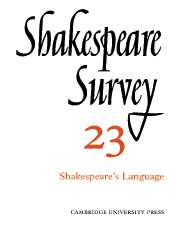Book contents
- Frontmatter
- Shakespeare and the Tune of the Time
- Some Functions of Shakespearian Word-formation
- Guide-lines for Interpreting the Uses of the Suffix ‘-ed’ in Shakespeare’s English
- Shakespeare’s Use of Colloquial Language
- Words, Action, and Artistic Economy
- ‘Antony and Cleopatra’: the Limits of Mythology
- Shakespeare’s ‘War with Time’: the Sonnets and ‘Richard II’
- Shakespeare and Christian Doctrine: Some Qualifications
- Shakespeare’s Poets
- The Text of Coleridge’s 1811–12 Shakespeare Lectures
- Shakespeare Studies in German: 1959–68
- A Neglected Jones/Webb Theatre Project: ‘Barber-Surgeons’ Hall Writ Large
- Interpretation or Experience? Shakespeare at Stratford
- 1 Critical Studies
- 2 Shakespeare’s Life, Times, and Stage
- 3 Textual Studies
- Index
- Plate section
The Text of Coleridge’s 1811–12 Shakespeare Lectures
Published online by Cambridge University Press: 28 March 2007
- Frontmatter
- Shakespeare and the Tune of the Time
- Some Functions of Shakespearian Word-formation
- Guide-lines for Interpreting the Uses of the Suffix ‘-ed’ in Shakespeare’s English
- Shakespeare’s Use of Colloquial Language
- Words, Action, and Artistic Economy
- ‘Antony and Cleopatra’: the Limits of Mythology
- Shakespeare’s ‘War with Time’: the Sonnets and ‘Richard II’
- Shakespeare and Christian Doctrine: Some Qualifications
- Shakespeare’s Poets
- The Text of Coleridge’s 1811–12 Shakespeare Lectures
- Shakespeare Studies in German: 1959–68
- A Neglected Jones/Webb Theatre Project: ‘Barber-Surgeons’ Hall Writ Large
- Interpretation or Experience? Shakespeare at Stratford
- 1 Critical Studies
- 2 Shakespeare’s Life, Times, and Stage
- 3 Textual Studies
- Index
- Plate section
Summary
When John Payne Collier moved house in Maidenhead in 1854, he discovered a set of shorthand notes he had taken more than forty years earlier at the lectures on Shakespeare and other poets given by S. T. Coleridge in 1811–12. He also, as he testified in the preface to Seven Lectures on Shakespeare and Milton by the late S. T. Coleridge (1856), found ‘transcripts in long-hand of some of the said notes’, on turning out a ‘double chest of drawers’, although diligent search on a number of previous occasions had failed to locate them. Collier announced his discovery in a series of four short contributions to Notes and Queries in July and August 1854. In the first two he printed excerpts from a diary he had kept at the time he attended the lectures, asserting that ‘only fragments remain’ of it, and he also reprinted the prospectuses of both the 1811–12 and the 1818 lectures given by Coleridge. In the last two he included some passages from his notes of the lectures. Of his ‘memoranda’ of seven lectures (numbers 1, 2, 6, 7, 8, 9 and 12 of the seventeen Coleridge gave in the series), he claimed that they were ‘generally very full, and in the ipsissima verba of the author’.
The publication of these extracts received favourable notice in The Athenaeum, which in turn provoked the retort of 'A Detective' in a pamphlet called Literary Cookery with Reference to Matter attributed to Coleridge and Shakespeare published in 1855. The editor of The Athenaeum, W. H. Dixon, like Collier himself a lawyer and antiquary, remained his loyal supporter, and had refused to print the contents of this pamphlet when the author submitted it as a letter to his periodical.
- Type
- Chapter
- Information
- Shakespeare Survey , pp. 101 - 112Publisher: Cambridge University PressPrint publication year: 1970

